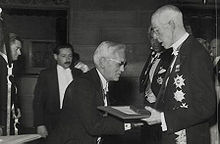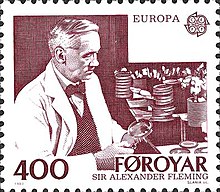Alexander Fleming
Alexander Fleming (Darvel, Scotland, August 6, 1881-London, England, March 11, 1955) was a British physician and scientist famous for being the discoverer of penicillin, observing coincidentally its antibiotic effects on a bacterial culture, was obtained from the fungus Penicillium notatum. He trained at the University of London, where he would later become a professor and researcher in bacteriology.He was awarded the Nobel Prize in Medicine in 1945. He also discovered the antimicrobial enzyme lysozyme.
Biography
Alexander Fleming was born in Darvel, Scotland, on August 6, 1881. He worked as a medical microbiologist at St. Mary's Hospital in London until the outbreak of World War I. In this hospital he worked in the Department of Inoculations, dedicated to the improvement and manufacture of vaccines or injections and serums. Almorth Edward Wright, secretary of the Department, piqued Fleming's interest in new treatments for infections and diseases.
Commissioned lieutenant in 1914 and promoted captain in 1917, Fleming served during World War I in the Royal Army Medical Corps. He and many of his colleagues worked in battlefield hospitals on the Western Front in France. In 1918 he returned to St Mary's Hospital, where he was elected Professor of Bacteriology at the University of London in 1928. In 1951 he was elected Chancellor of the University of Edinburgh for a three-year term.
Discoveries
The two discoveries by Alexander Fleming occurred in the twenties and although they were accidental, they demonstrate the great capacity for observation and intuition of this Scottish doctor. He discovered lysozyme after mucus from a sneeze fell onto a Petri dish growing a bacterial culture. A few days later he noticed that the bacteria had been destroyed in the place where the nasal fluid had been deposited.
Fleming's lab was habitually cluttered, which proved to be an asset to his next discovery. On September 28, 1928, he was carrying out various experiments in his laboratory and on the 22nd, when inspecting his cultures before destroying them, he noticed that a colony of a fungus had grown spontaneously, as a contaminant, in one of the seeded Petri dishes. with Staphylococcus aureus. Fleming later observed the plates and found that the bacterial colonies around the fungus (later identified as Penicillium notatum) were transparent due to bacterial lysis. To be more exact, Penicillium is a mold that produces a natural substance with antibacterial effects: penicillin. Lysis meant the death of the bacteria, and in its case, that of the pathogenic bacteria (Staphylococcus aureus) grown on the plate. Although he immediately recognized the significance of this finding, his colleagues underestimated it. Fleming reported his discovery of penicillin in the British Journal of Experimental Pathology in 1929.
Fleming worked with the fungus for a while, but obtaining and purifying penicillin from Penicillium notatum cultures proved difficult and more appropriate for chemists. The scientific community believed that penicillin would only be useful for treating trivial infections and therefore paid no attention to it.
However, the antibiotic aroused the interest of American researchers during World War II, who were trying to emulate German military medicine, which had sulfa drugs. Chemists Ernst Boris Chain and Howard Walter Florey developed a penicillin purification method in England that allowed its synthesis and commercial distribution to the rest of the population, however, this country had all of its industrial infrastructure dedicated to the needs of war. For this reason, both researchers went to the United States to set up production plants dedicated exclusively to penicillin.
Fleming did not patent his discovery, believing that this would make it easier to spread an antibiotic necessary for the treatment of the numerous infections that plagued the population. For his discoveries, Fleming shared the Nobel Prize in Medicine in 1945 with Ernst Boris Chain and Howard Walter Florey.
Fleming was a member of the Chelsea Arts Club, a private club for artists founded in 1891 at the suggestion of painter James McNeil Whistler. It is anecdotally told that Fleming was admitted to the club after making 'germ paintings', paintings that consisted of brushing the canvas with pigmented bacteria, which were invisible while painting but emerged with intense colors once grown. after incubating the canvas. The bacterial species he used were:
- Serratia marcescens - Red.
- Chromobacterium violaceum - purple.
- Micrococcus luteus - yellow.
- Micrococcus varians - white.
- Micrococcus roseus - Pink.
- Bacillus sp. - orange
While traveling through Spain in 1948, his wife fell ill with a disease that would cut short her life months later. However, he continues his work at the Institute of St. Mary (Saint Mary's College) that he has directed since 1946. There he meets Dr. Voureka, whom he marries in 1953.
Alexander Fleming died in London in 1955 of a heart attack. He was buried as a national hero in the crypt of London's St Paul's Cathedral.
His discovery of penicillin meant a drastic change for modern medicine, starting the so-called «Age of antibiotics», other later researchers contributed new antibiotics, such as streptomycin used for the treatment of tuberculosis, saving millions of lives. Fleming's scientific contribution is double because in addition to discovering a chemical molecule (penicillin) he also found an enzymatic molecule (lysozyme) with antibiotic activity. Enzymes, such as lysozyme, and antibiotic peptides are natural components of the innate immunity of animals that could be used for therapeutic purposes similar to penicillin. For this reason Fleming can be considered the first to discover an antimicrobial enzyme.
Honour
- Quote corresponding to the edition of "Titles and Appointments" / "Condecortions".
Titles and appointments
- In 1944, he was appointed Sir for King George VI.
- He was named Knight Bacheloralso by King George VI in 1944.
- Nobel Prize in Medicine in 1945.
- In 1951 he was appointed rector of the University of Edinburgh
- Member of the Pontifical Academy of Sciences (Vatican City).
- Member of the Royal Society of the United Kingdom, FRS (Fellow of Royal Societ(y).
- Member of the Royal College of Surgeons of England (Royal College of Surgeons of England).
- In 1999 Time magazine named it one of the 100 most important people in the centuryXX..
Decorations
- Grand Cross of the Civil Order of Alfonso X el Sabio, in 1948 (Spain)
- Great Cross of the Legion of Honor of the French Republic.
- Medal to Merit, civil decoration that is granted by the President of the United States.
- Great Cross of the Order of the Phoenix (Greece).
Legacy
.
Fleming's discovery of penicillin changed the world of modern medicine by ushering in the era of useful antibiotics; penicillin has saved, and continues to save, millions of people around the world.
The laboratory at St Mary's Hospital where Fleming discovered penicillin is home to the Fleming Museum, a popular London attraction. His alma mater, St Mary's Hospital Medical School, merged with Imperial College London in 1988. In 1998 the Sir Alexander Fleming Building opened on the South Kensington campus, where his son Robert and her great-granddaughter Claire were presented to the Queen; it is currently one of the main pre-clinical teaching sites of the Imperial College School of Medicine.
His other alma mater, the Royal Polytechnic Institution (now the University of Westminster) has named one of its student residences Alexander Fleming House, which is near Old Street.
- In 1999, the magazine Time named Fleming one of the 100 most important people of the centuryXX.affirming:
It was a discovery that would change the course of history. The active ingredient of that mold, to which Fleming gave the name penicillin, turned out to be an agent of enormous power to fight infections. When finally recognized for what it was, the most effective drug in the world to save lives, penicillin would forever change the treatment of bacterial infections. In the middle of the century, Fleming's discovery had generated a huge pharmaceutical industry, producing synthetic penicillins that would end some of humanity's oldest scourges, such as syphilis, gangrene and tuberculosis.
- The importance of his work was recognized with the placement of a plaque such as the International Historic Chemical Landmark at the Alexander Fleming Laboratory Museum in London on 19 November 1999.
- When the year 2000 was approaching, at least three major Swedish magazines described penicillin as the most important discovery of the millennium.
- In 2002, Fleming was named on the BBC list of the 100 most important British after a nationwide vote.
- A statue of Alexander Fleming is located opposite the main bullring of Madrid, the Plaza de Toros de Las Ventas. It was established by subscription of the grateful slaughterers, as penicillin greatly reduced the number of deaths of the shooters in the bullring.
- Flemingovo náměstí is a square that bears the name of Fleming in the university area of the Dejvice community in Prague.
- A high school is named in Sofia, Bulgaria.
- In Athens, Greece, a small square in the central district of Votanikos bears the name of Fleming and its bust. There are also several streets in the centre of Athens and other cities in Greece that bear the name of Fleming or his second Greek wife, Amalia.
- In mid-2009 Fleming was commemorated in a new series of tickets issued by the Clydesdale Bank; its image appears in the new issue of 5 pounds sterling tickets.
- In 2009, Fleming was voted the third best Scottish in an opinion poll conducted by the STV television channel, just behind the Scottish national poet Robert Burns and the national hero William Wallace.
- The Fleming station, in the Metro network of Thessaloniki, takes its name from Fleming Street where it is located.
- Sir Alexander Fleming College is a British College in Trujillo, north of Peru
Eponymy
- The lunar crater Fleming bears this name in his memory, honor shared with the American astronomical of the same name Williamina Fleming (1857-1911).
- 91006 Fleming, an asteroid of the Asteroid Belt, bears the name of Fleming.
- Bromeliaceae Bromelia flemingii I. Ramirez " Carnevali
Contenido relacionado
Diapedesis
Alvar Aalto
Cesar M. Arconada



